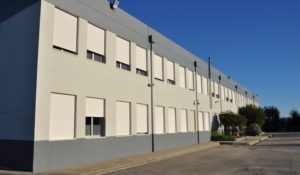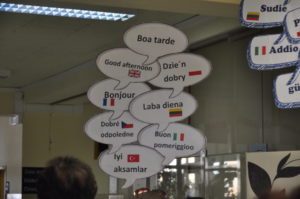The Agrupamento de Escolas de Arrifana – School in Portugal
 The Agrupamento de Escolas de Arrifana, Santa Maria da Feira is a group of schools (15 establishments belonging to 5 parishes of the municipality of Santa Maria da Feira), with students from preschool to the 9th grade, with 1000 students from 3 to 15 years old. 41 students (3.8%) have Special Needs. B. The Agrupamento works with 100 teachers and 154 are staff.
The Agrupamento de Escolas de Arrifana, Santa Maria da Feira is a group of schools (15 establishments belonging to 5 parishes of the municipality of Santa Maria da Feira), with students from preschool to the 9th grade, with 1000 students from 3 to 15 years old. 41 students (3.8%) have Special Needs. B. The Agrupamento works with 100 teachers and 154 are staff.
In the past it was a TEIP (Educational Territory of Priority Intervention) and in 2012 added two groups (Arrifana and Milheirós de Poiares) of low socioeconomic level (49.4%, 529 students have finantial support by the School Social services. Parents have low qualifications (4th and 6th grade -for mothers, 48.4% and fathers-55.5%) and their incomes are low despite “only” 10.6% are unemployed. Most of the families don’t give support to their children or recognize the importance of school in their lives.27,4% (260) of the students have already been retained one or more times. 15.4% of the students were retained in the 2nd year, which means great difficulties in terms of basic skills, namely at the pre-school level.
This group of schools is taking into account the different motivations of the students and in order to give more opportunities to students at risk ,since 2005, has extended the training program with Education and Youth Training Courses (ICT Technician, Commercial, Electrician, Plumber, Beauty Care) and from 2013/2014 the Vocational Courses (Pastry, Craft, Gardening, ICT and Performative Arts). The Contract of Autonomy established with the Ministry of Education (11/11/2013) is to promote better school results. In order to respond to this precept, the Learning Culture Project was created to promote the improvement of school outcomes through actions for students, parents and teachers. Since its implementation, the results of the final exams had improved in each one of the three years o(4th, 6th and 9th) in the subject of Portuguese and Mathematics, and the difference between internal and external evaluation was reduced. A new dynamic was created in the cooperative work within each disciplinary group /departments and articulation between cycles.
 The work of the groups is monitored, the classroom is monitored by a couple in each period, the plans are joint as well as the definition of strategies. The specific criteria are openly discussed, the evaluation tests are made together, the evaluation proposals, on the subject group are harmonized. Teachers are encouraged to innovate and build an approach to the teaching-learning process more adequate to the level, motivation and learning pace of the students. On Portuguese, Mathematics and English subjects, in the 6th and 9th grade, students have an extra teacher to help them to learn, to facilitate the learning. In the 5th and 7th grade, on Mathematics we have developed the TurmaMais project to combat school failure. All these measures are inserted In the National Plan for the Promotion of Educational Success (PAE). We have specific tutorial support for students with 2 or more retentions (97).
The work of the groups is monitored, the classroom is monitored by a couple in each period, the plans are joint as well as the definition of strategies. The specific criteria are openly discussed, the evaluation tests are made together, the evaluation proposals, on the subject group are harmonized. Teachers are encouraged to innovate and build an approach to the teaching-learning process more adequate to the level, motivation and learning pace of the students. On Portuguese, Mathematics and English subjects, in the 6th and 9th grade, students have an extra teacher to help them to learn, to facilitate the learning. In the 5th and 7th grade, on Mathematics we have developed the TurmaMais project to combat school failure. All these measures are inserted In the National Plan for the Promotion of Educational Success (PAE). We have specific tutorial support for students with 2 or more retentions (97).
We have European projects since 2008 – Comenius, Leonardo and Erasmus+ and we developed this projects with more than 100 mobilities around europe and share good practices that we could disseminate after the end of each project. The school since then became more aware of the european citizenship working subjects like culture, water, special needs, history, geography, arts, drama and improved our network with school from all europe.
This project helps us exchange experiences with other countries and improve our teaching skills and at the same time helps our students reflect on the disability and displacement issues.
